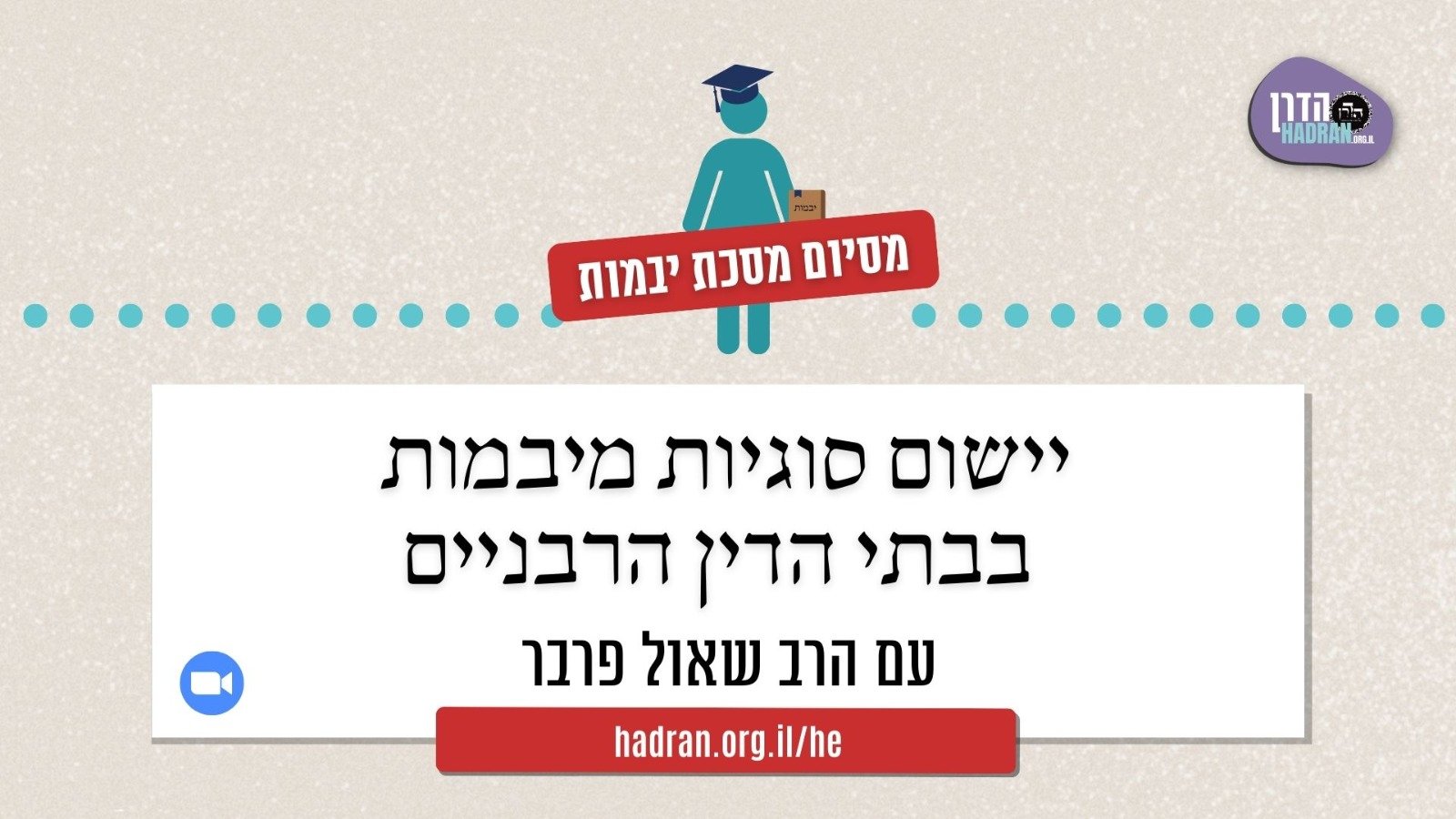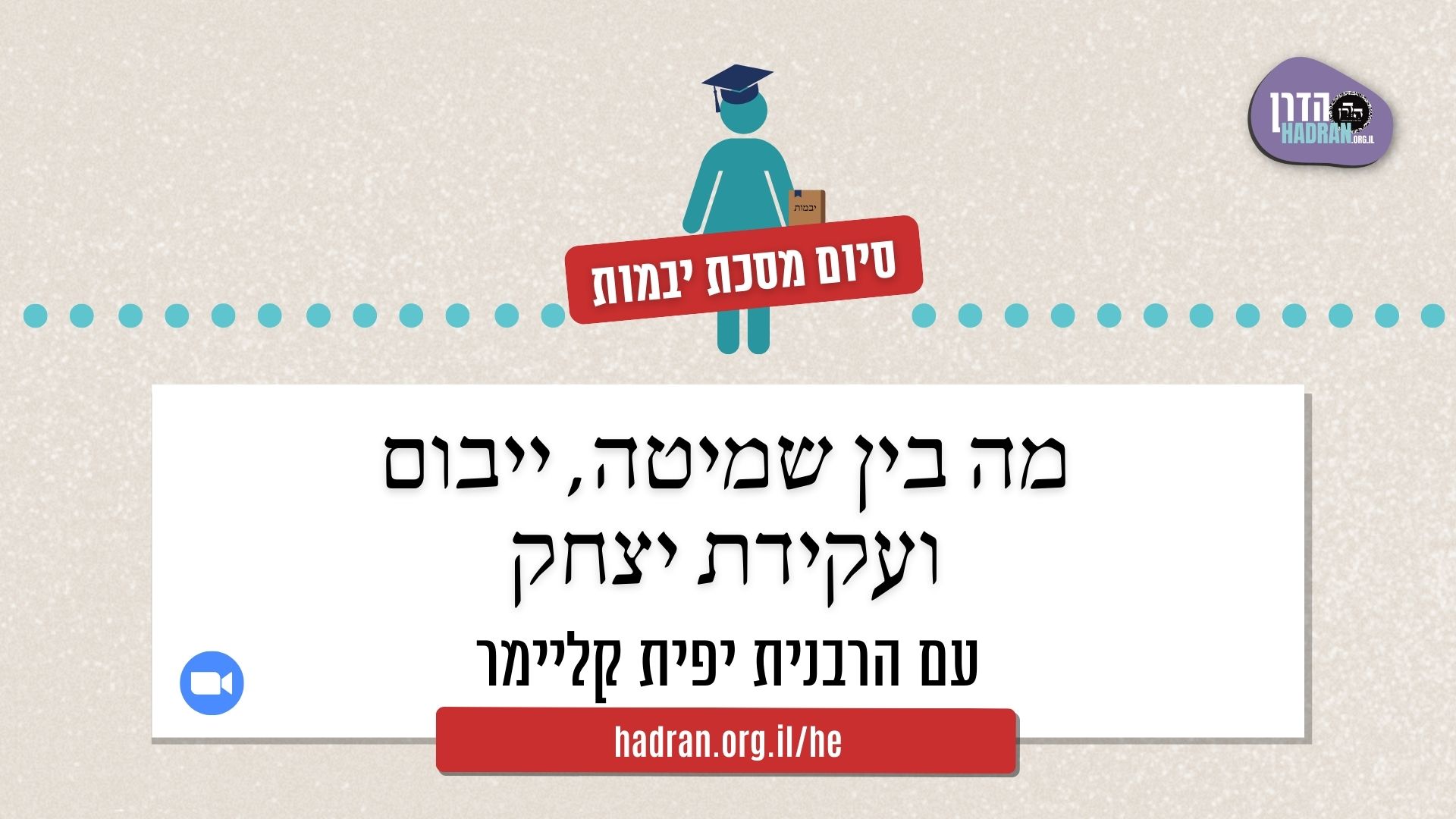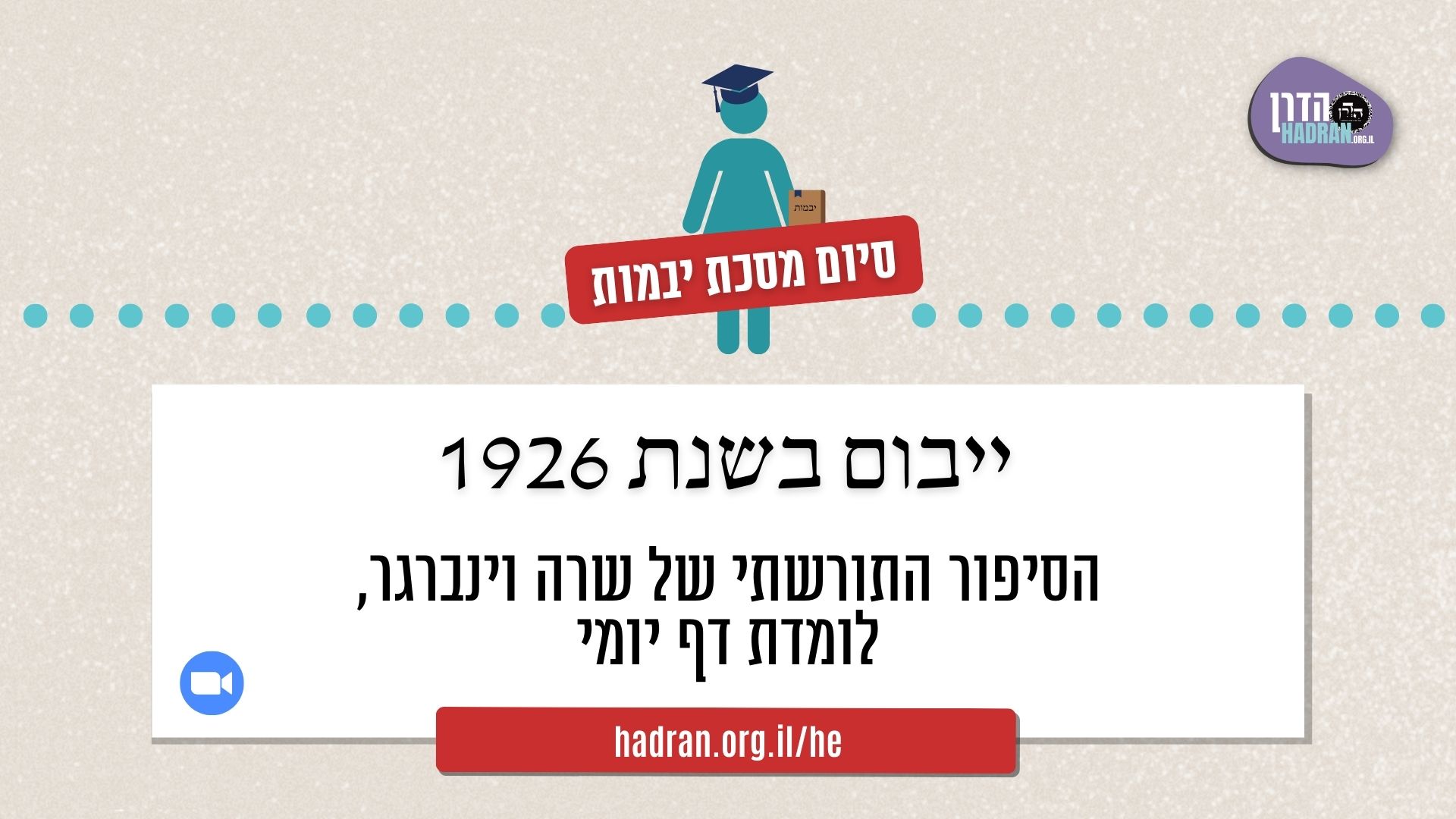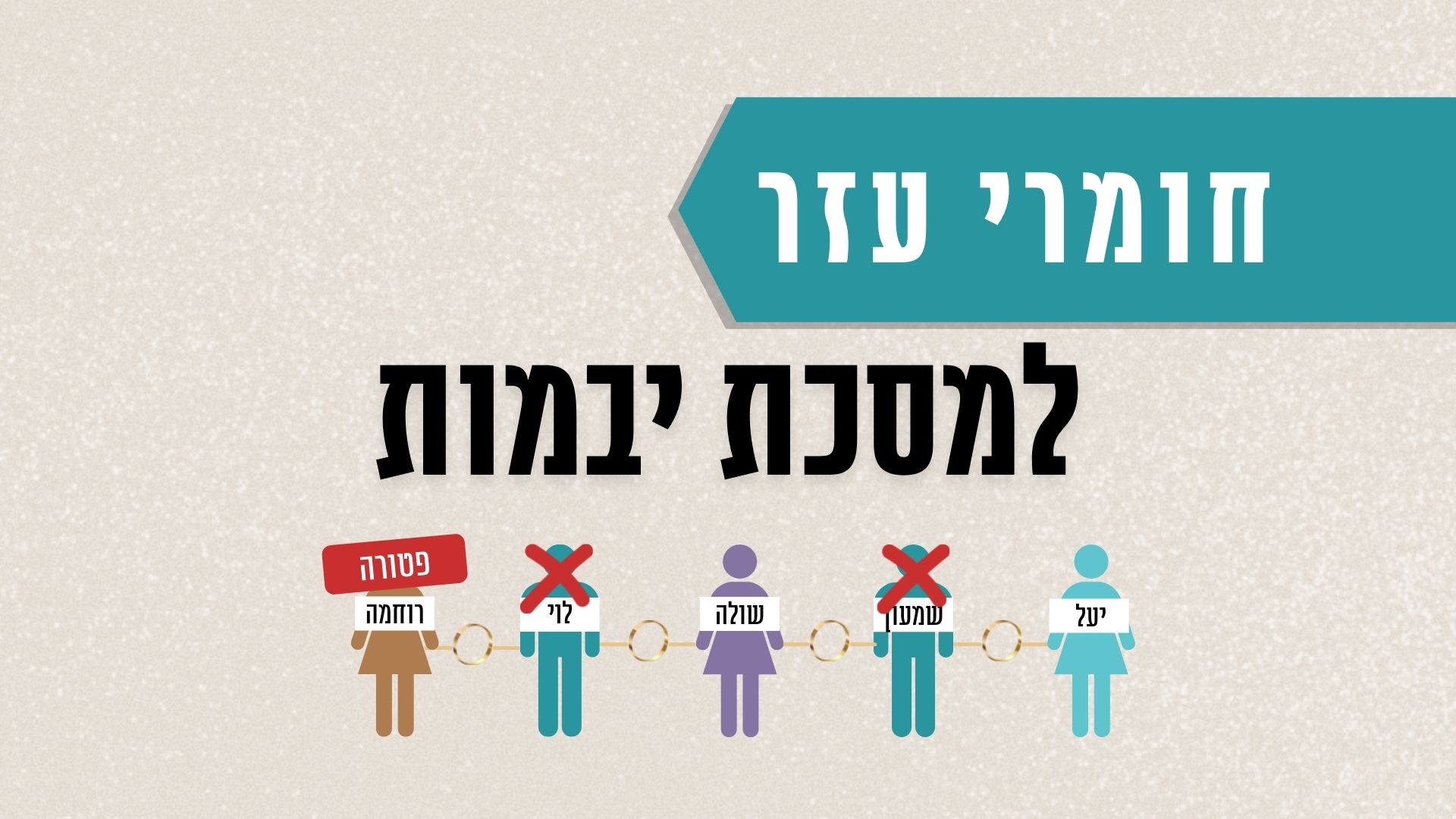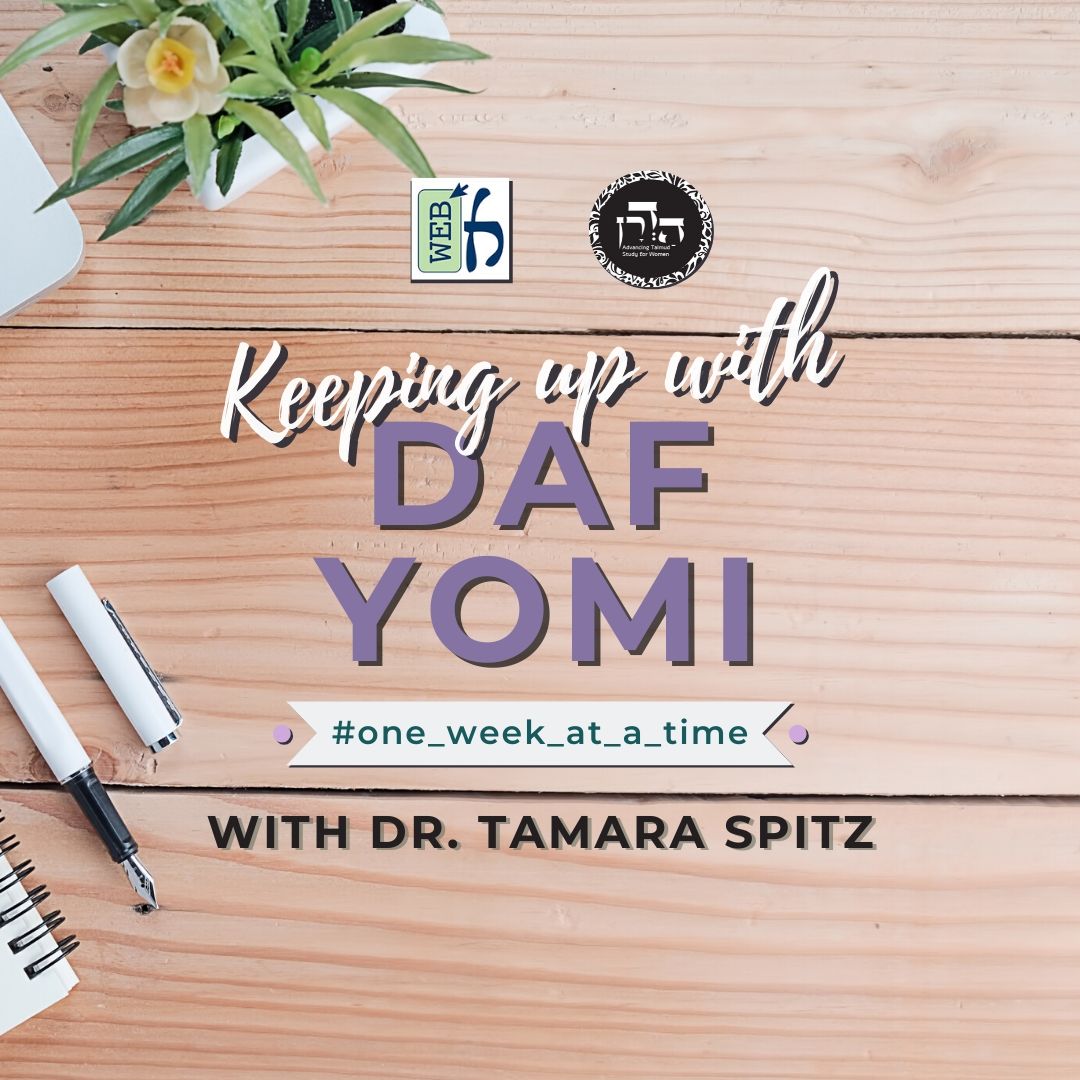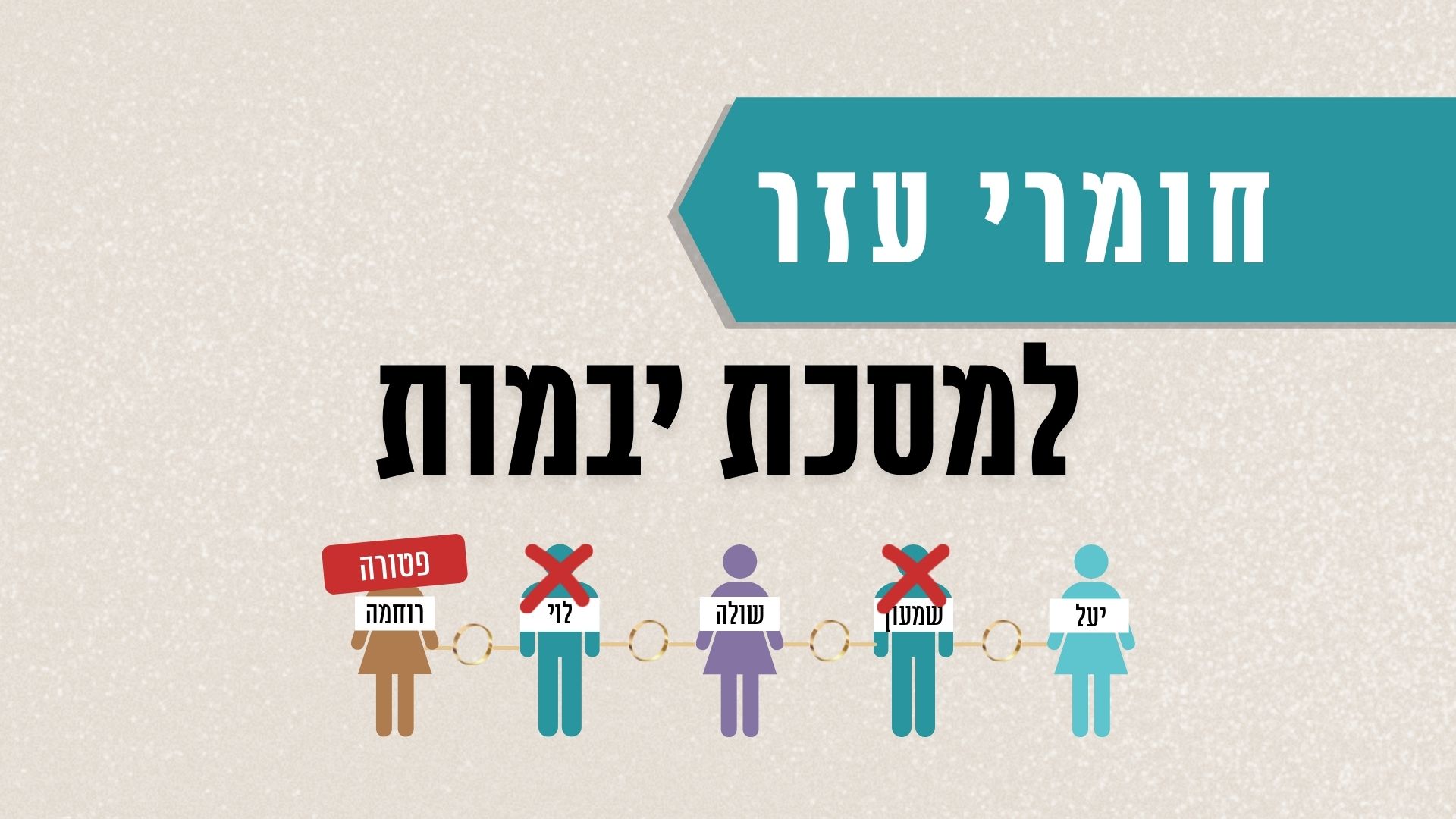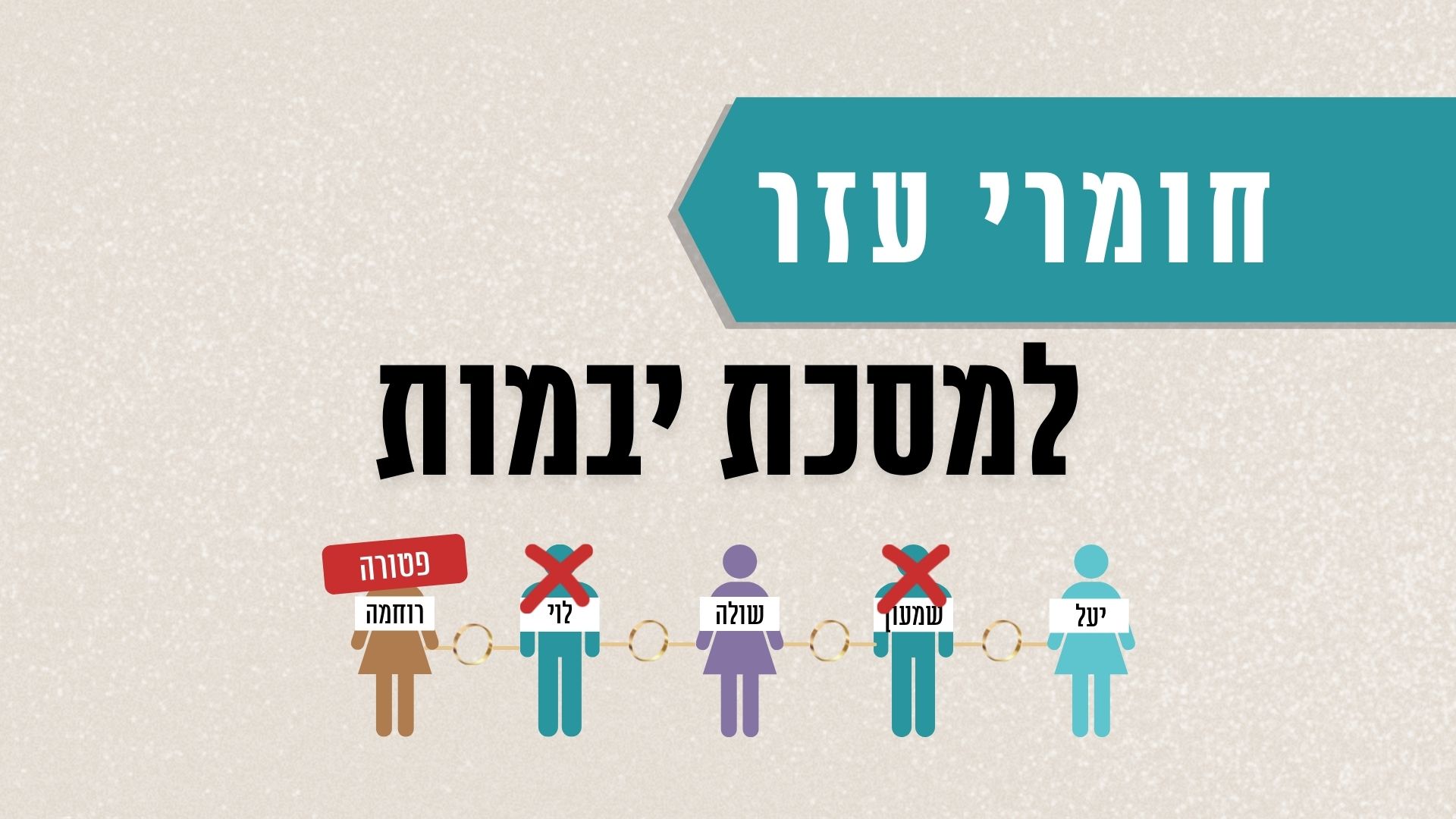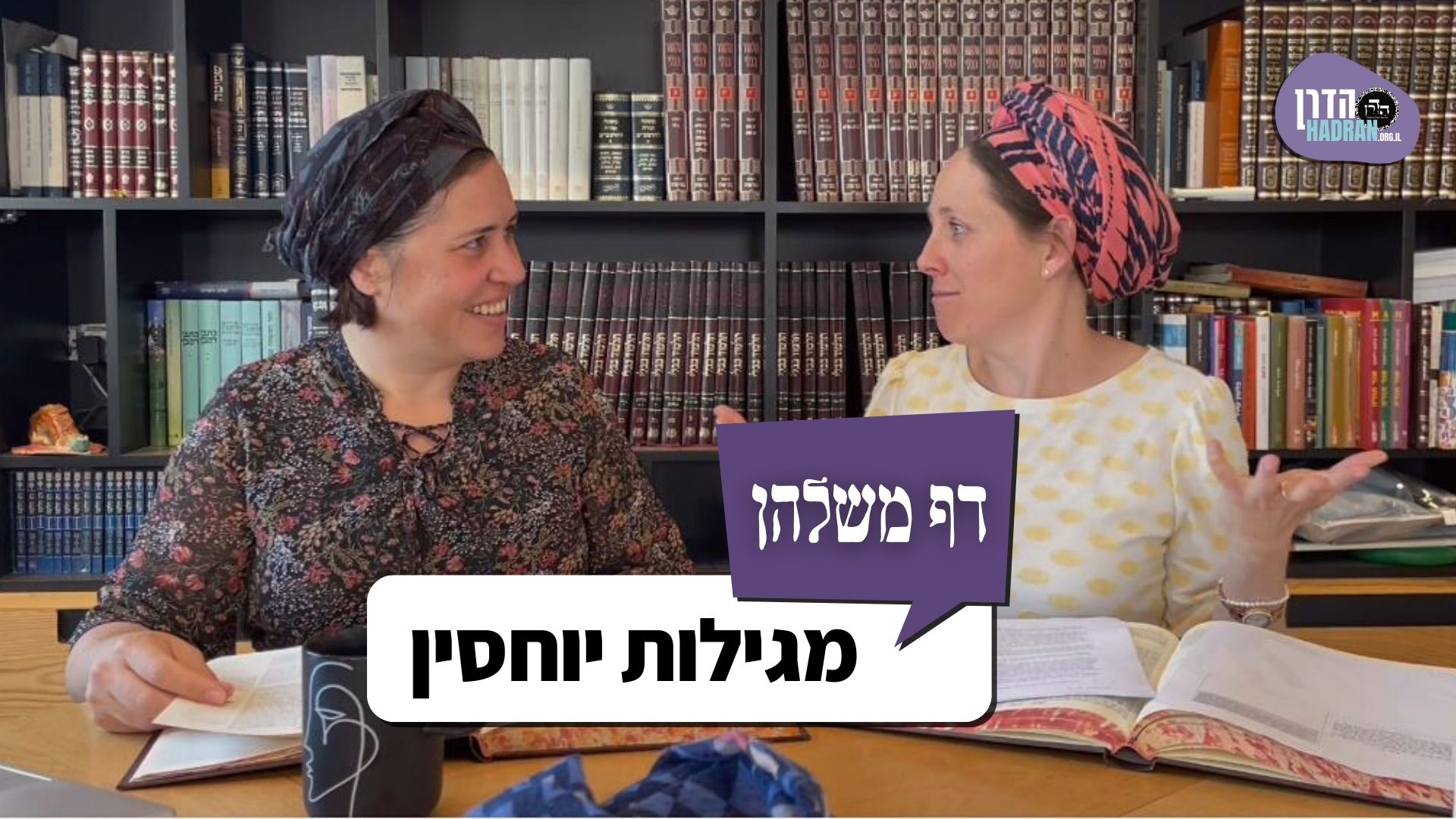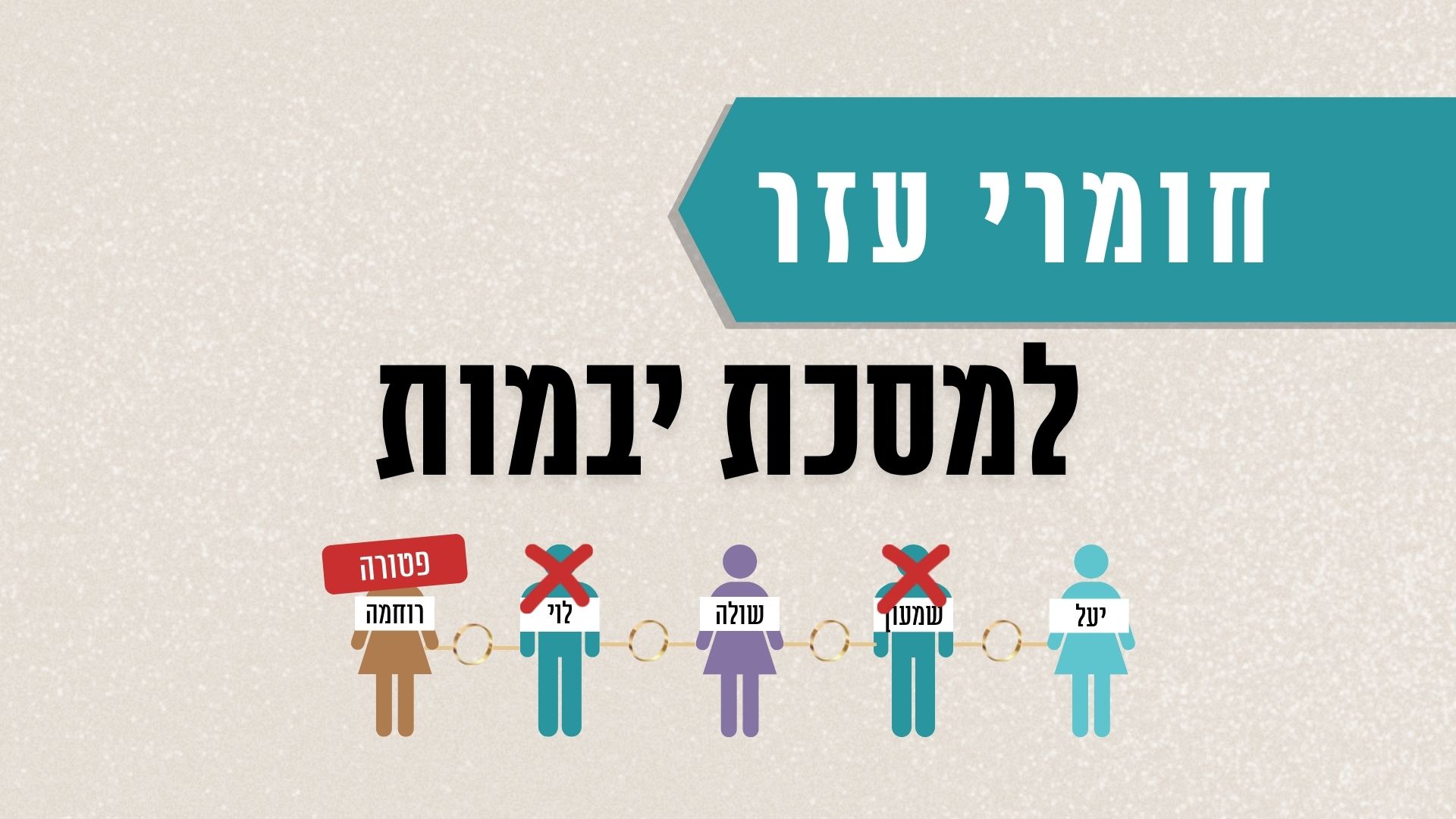יבמות יב
אֲמַר לֵיהּ, תְּנֵיתוּהָ: הָיְתָה אַחַת כְּשֵׁרָה וְאַחַת פְּסוּלָה, אִם הָיָה חוֹלֵץ — חוֹלֵץ לַפְּסוּלָה, וְאִם הָיָה מְיַיבֵּם — מְיַיבֵּם לַכְּשֵׁרָה. מַאי ״כְּשֵׁרָה״ וּמַאי ״פְּסוּלָה״? אִילֵּימָא ״כְּשֵׁרָה״ — כְּשֵׁרָה לְעָלְמָא, ״פְּסוּלָה״ — פְּסוּלָה לְעָלְמָא, כֵּיוָן דִּלְדִידֵיהּ חַזְיָא — מַאי נָפְקָא לֵיהּ מִינַּהּ?
Rabbi Ami said to Rabbi Ḥiyya bar Abba: We learned it in the same baraita: In a case where one of the women was fit and the other disqualified, if he would like to perform ḥalitza he performs ḥalitza with the disqualified woman, and if he would like to enter into levirate marriage, he enters into levirate marriage with the fit woman. What is fit and what is disqualified? If we say that fit means fit to all men, and disqualified means disqualified to all men, since for him she is suitable, what difference does it make for him whether she is disqualified from or fit for marriage to others?
אֶלָּא לָאו: ״כְּשֵׁרָה״ — כְּשֵׁרָה לֵיהּ, ״פְּסוּלָה״ — פְּסוּלָה לֵיהּ. וּמַאי נִיהוּ — מַחֲזִיר גְּרוּשָׁתוֹ. וְקָתָנֵי: אִם הָיָה מְיַיבֵּם — מְיַיבֵּם לַכְּשֵׁרָה.
Rather, is it not the case that fit means fit for him, and disqualified means disqualified for him? And what is that case in which a woman is fit or disqualified only with regard to him but not to any other man? This is referring to the case of one who remarries his divorcée. And it is taught that if he would like to enter into levirate marriage, he enters into levirate marriage with the fit woman. This answers Rabbi Yoḥanan’s question.
לָא: כְּשֵׁרָה לְעָלְמָא, פְּסוּלָה לְעָלְמָא. וּדְקָאָמְרַתְּ, כֵּיוָן דִּלְדִידֵיהּ חַזְיָא, מַאי נָפְקָא לֵיהּ מִינַּהּ — מִשּׁוּם דְּרַב יוֹסֵף. דְּאָמַר רַב יוֹסֵף: כָּאן שָׁנָה רַבִּי לֹא יִשְׁפּוֹךְ אָדָם מֵי בוֹרוֹ וַאֲחֵרִים צְרִיכִים לָהֶם.
The Gemara rejects this argument: No; actually, fit means fit to all men, and disqualified means disqualified in general, e.g., a woman who had already been divorced is disqualified from marrying any priest. And that which you said: Since for him she is suitable, what difference does it make for him, this is significant because of that statement of Rav Yosef. As Rav Yosef said: Here Rabbi Yehuda HaNasi taught a valuable moral lesson, that a person should not pour the water from his well when others are in need of it.
תָּא שְׁמַע: הַמַּחְזִיר גְּרוּשָׁתוֹ מִשֶּׁנִּיסֵּת — הִיא וְצָרָתָהּ חוֹלֶצֶת. הִיא וְצָרָתָהּ סָלְקָא דַּעְתָּךְ? אֶלָּא אֵימָא: אוֹ הִיא אוֹ צָרָתָהּ! וְלָאו תָּרוֹצֵי קָא מְתָרְצַתְּ לַהּ? תָּרֵיץ הָכִי: הִיא — חוֹלֶצֶת, צָרָתָהּ — אוֹ חוֹלֶצֶת אוֹ מִתְיַיבֶּמֶת.
Come and hear a different baraita: With regard to one who remarries his divorcée after she had married another, she and her rival wife must perform ḥalitza. Can it enter your mind that both she and her rival wife must perform ḥalitza? Rather, say: Either she or her rival wife. This indicates that both women are unfit for levirate marriage. The Gemara rejects this claim: And did you not already resolve a difficulty in the baraita? If so, answer as follows: She performs ḥalitza, while her rival wife either performs ḥalitza or enters into levirate marriage. If so, this baraita provides no conclusive proof that might resolve Rabbi Yoḥanan’s dilemma.
אָמַר רַב לֵילֵי בַּר מֶמֶל, אָמַר מָר עוּקְבָא, אָמַר שְׁמוּאֵל: צָרַת מְמָאֶנֶת אֲסוּרָה. לְמַאן? אִילֵימָא לָאַחִים: הַשְׁתָּא הִיא גּוּפַהּ שַׁרְיָא, דְּאָמַר שְׁמוּאֵל: מֵיאֲנָה בָּזֶה מוּתֶּרֶת בָּזֶה — צָרָתָהּ מִיבַּעְיָא?
§ The Gemara cites another discussion concerning women who are forbidden in levirate marriage. Rav Lili bar Memel said that Mar Ukva said that Shmuel said: The rival wife of a girl who performed refusal is forbidden. If the deceased brother had two wives, one of whom was a minor who refused the brother who sought to be her yavam, not only is she forbidden in levirate marriage, but so too is her rival wife. The Gemara asks: To whom is she forbidden? If we say that she is forbidden to the other brothers, this cannot be the case, as now that she herself, the girl who actually performed refusal, is permitted to them, as Shmuel said: A minor yevama who refused this brother is permitted to that other brother of the deceased husband, is it necessary to state that her rival wife is likewise permitted?
אֶלָּא לְדִידֵיהּ, וּמַאי שְׁנָא מְמָאֶנֶת דְּשַׁרְיָא לְאַחִין — דְּלָא עָבְדָא בְּהוּ מַעֲשֶׂה? צָרָה נָמֵי לָא עָבְדָא בְּהוּ מַעֲשֶׂה!
Rather, it means that she is forbidden to him, i.e., as she refused a specific brother, both she and her rival wife are forbidden to him. The Gemara clarifies: And in what way is this halakha of the rival wife different from that of one who performed refusal, who is permitted to the other brothers? If the reason is that she did not perform any act of refusal with them that might nullify the obligation of levirate marriage, her rival wife did not perform any act with them either, and therefore she should be permitted to all of the brothers.
גְּזֵירָה מִשּׁוּם צָרַת בִּתּוֹ מְמָאֶנֶת. וְצָרַת בִּתּוֹ מְמָאֶנֶת מִי אֲסִירָא? וְהָתְנַן: וְכוּלָּן אִם מֵתוּ אוֹ מֵיאֲנוּ — צָרוֹתֵיהֶן מוּתָּרוֹת!
The Gemara answers: This is a rabbinic decree imposed due to the case of a rival wife of one’s daughter who performed refusal. If the girl who refused was his daughter or any other forbidden relative, her rival wife would be forbidden as the rival wife of one’s daughter. Therefore, the Sages rendered forbidden the rival wives of other women who performed refusal, not only his daughter. The Gemara asks: And is the rival wife of a daughter who performed refusal actually forbidden? But didn’t we learn in the mishna: And with regard to all of these women, if they died or performed refusal with their husbands, their rival wives are permitted.
דְּמֵיאֲנָה בְּמַאן? אִילֵימָא דְּמֵיאֲנָה בְּבַעַל, הַיְינוּ גְּרוּשָׁה! אֶלָּא לָאו — בְּיָבָם.
The Gemara analyzes this statement: Whom did this girl refuse? If we say that she refused the husband, i.e., the deceased brother before he passed away, this is exactly the same as the case of a divorcée, and the mishna explicitly states that if one’s relative who had been married to his deceased brother died, or refused her husband, or was divorced, no prohibition applies to her rival wife. What is the difference between refusal and divorce? Rather, is it not referring to a case where she refused the yavam? If she refuses the yavam, her levirate bond is broken and her rival wife is no longer considered the rival wife of a forbidden relative. Consequently, the rival wife is fit for levirate marriage. This shows that no prohibition applies to the rival wife of a daughter who performed refusal.
לָא: לְעוֹלָם בְּבַעַל, וּתְרֵי גַּוְונֵי גֵּירוּשִׁין. וּמַאי שְׁנָא כִּי מֵיאֲנָה בְּבַעַל — דַּעֲקַרְ[תִּ]ינְהוּ לְנִשּׂוּאִין,
The Gemara answers: No; actually, it means that she refused the husband, and two types of divorce are listed in the mishna: Divorce by Torah law and refusal, which is a form of divorce that applies by rabbinic law. The Gemara asks: And what is different between the two cases? Since refusal is not actually divorce but is a form of annulment that nullifies the matrimonial bond retroactively, when she refuses her husband it must be said that she uproots the marriage, and therefore the rival wife is rendered permitted.
כִּי מֵיאֲנָה בְּיָבָם נָמֵי — נִשּׂוּאִין קַמָּאֵי קָא עָקְרָא!
If so, when she refuses the yavam, one should also say that she uproots the first marriage. The reasoning is that she cannot actually refuse the yavam, as she was never married to him. Rather, it must be that she annuls her first marriage, and the bond with the yavam is canceled automatically. Consequently, it is as though she were not married at all, and there was never a rival wife.
מִשּׁוּם דְּתָנֵי רָמֵי בַּר יְחֶזְקֵאל. דְּתָנֵי רָמֵי בַּר יְחֶזְקֵאל: מֵיאֲנָה בַּבַּעַל — מוּתֶּרֶת לְאָבִיו, בַּיָּבָם — אֲסוּרָה לְאָבִיו.
The Gemara explains that Shmuel’s reasoning is due to the statement that Rami bar Yeḥezkel taught in a baraita as Rami bar Yeḥezkel taught: If a minor refused her husband, she is permitted in marriage even to his father, as refusal completely nullifies the marriage, and it is as though there had never been any earlier marriage with the son. However, if she refused the yavam, not her husband, she is forbidden to his father.
אַלְמָא, מִשְּׁעַת נְפִילָה נִרְאֵית כְּכַלָּתוֹ.
Apparently, from the moment when she came before the yavam for levirate marriage she appears to be his father’s daughter-in-law. Since at the time of the husband’s death she had not yet performed refusal, to all appearances she was the father’s daughter-in-law. Consequently, although the marriage of this minor was not valid by Torah law, any observer would have assumed it was a proper marriage. Therefore, the Sages rendered a girl who refused her yavam forbidden to his father, so that people not take lightly the prohibition of those with whom relations are forbidden.
הָכָא נָמֵי, מִשְּׁעַת נְפִילָה נִרְאֵית כְּצָרַת בִּתּוֹ.
Here, too, the same reasoning applies: From the moment when the other wife came before the yavam for levirate marriage she appears to be the rival wife of his father’s daughter. For this reason she is forbidden, despite the fact that she is permitted by Torah law. Shmuel’s ruling that the rival wife of a girl who performed refusal is forbidden is therefore a decree due to the case of the rival wife of a daughter who performed refusal.
אָמַר רַב אַסִּי: צָרַת אַיְלוֹנִית אֲסוּרָה, שֶׁנֶּאֱמַר: ״וְהָיָה הַבְּכוֹר אֲשֶׁר תֵּלֵד״ — פְּרָט לָאַיְלוֹנִית שֶׁאֵינָהּ יוֹלֶדֶת.
§ The Gemara continues to discuss various cases of forbidden women. Rav Asi said: The rival wife of a sexually underdeveloped woman [aylonit] is forbidden. In other words, if one of the wives of the deceased brother was an aylonit, who is incapable of giving birth, the mitzva of levirate marriage does not apply. As it is stated with regard to a woman who requires levirate marriage: “The firstborn that she bears” (Deuteronomy 25:6), which comes to exclude an aylonit, who cannot give birth. Since the halakhot of levirate marriage do not apply to an aylonit, she retains her status as a brother’s wife who is forbidden, and therefore her rival wife is also exempt from levirate marriage.
מֵתִיב רַב שֵׁשֶׁת: שְׁלֹשָׁה אַחִין נְשׂוּאִין שָׁלֹשׁ נָשִׁים נׇכְרִיּוֹת, וּמֵת אֶחָד מֵהֶם, וְעָשָׂה בָּהּ שֵׁנִי מַאֲמָר,
Rav Sheshet raised an objection to this from a mishna: Three brothers are married to three unrelated women, and one of the brothers died, and a second brother performed levirate betrothal with the yevama. A levirate betrothal does not have the legal status of a regular betrothal, as the levirate bond between yavam and yevama is not dependent upon betrothal; rather, it represents a kind of continuation of the previous marriage with her deceased husband. Full marriage with a yevama is effected by sexual intercourse alone. However, for reasons of modesty, the Sages instituted that the act of betrothal should apply to a yevama as well.
וּמֵת — הֲרֵי אֵלּוּ חוֹלְצוֹת וְלֹא מִתְיַיבְּמוֹת, שֶׁנֶּאֱמַר: ״וּמֵת אֶחָד מֵהֶם יְבָמָהּ יָבֹא עָלֶיהָ״, מִי שֶׁעָלֶיהָ זִיקַת יָבָם אֶחָד, וְלֹא זִיקַת שְׁנֵי יְבָמִין.
And this brother who performed the levirate betrothal died before consummation of the marriage. In this case, both of these, the wife of the first brother, who had already come before the second brother for levirate marriage, and the wife of the second brother, perform ḥalitza and may not enter into levirate marriage. As it is stated: “And one of them dies and he has no child, the wife of the dead man shall not be married outside of the family to one not of his kin; her brother-in-law will have intercourse with her” (Deuteronomy 25:5). This implies that the option of levirate marriage applies only to one who is subject to the levirate bond of one yavam, for only one deceased brother, and not the bond of two yevamin. Since it is considered as though the first widow has two levirate duties to fulfill, neither she nor her rival wife may enter into levirate marriage.
וְקָתָנֵי עֲלַהּ, אָמַר רַב יוֹסֵף: זוֹ הִיא צָרַת אֵשֶׁת אָח מֵאָב, שֶׁאִיסּוּר נְפִילָה גָּרַם לָהּ. שֶׁלֹּא מָצִינוּ בְּכׇל הַתּוֹרָה כּוּלָּהּ כְּגוֹן זֹאת.
And it is taught with regard to this issue that Rav Yosef said: This is an example of a rival wife of a paternal half brother’s wife, i.e., a fully fit yevama, for whom coming before the yavam for levirate marriage caused her to be forbidden. In other words, she was fully fit for levirate marriage by Torah law, as all conditions of the mitzva are present in her case. The reason for her prohibition has nothing to do with her particular status but is the result of her having come before a yavam for levirate marriage once already. We have not found in the entire Torah an example like this, where the fact that she was obligated in a mitzva she was unable to fulfill means that not only she, but her rival wife as well, are both rendered forbidden.
״זוֹ הִיא״ — לְמַעוֹטֵי מַאי? לָאו לְמַעוֹטֵי צָרַת אַיְלוֹנִית, דְּשַׁרְיָא?!
The Gemara analyzes Rav Yosef’s statement: The emphasis of: This is, which indicates that it applies to this case and no other, comes to exclude what? Doesn’t it come to exclude the rival wife of an aylonit, which would mean that she is permitted? Although an aylonit herself may marry any man, she is not suitable for levirate marriage. If so, Rav Yosef’s comment indicates that only a woman subject to a double levirate bond, not any other case, renders her rival wife forbidden merely by coming before the yavam for levirate marriage.
לָא, לְמַעוֹטֵי צָרַת אַיְלוֹנִית, דַּאֲסִירָא. וּמַאי ״זוֹ הִיא״ — זוֹ הִיא, דְּאִיסּוּר נְפִילָה גָּרַם לָהּ — צָרָתַהּ בָּעֲיָא חֲלִיצָה, אַיְלוֹנִית — אֲפִילּוּ חֲלִיצָה לָא בָּעֲיָא. מַאי טַעְמָא: הָא דְּאוֹרָיְיתָא, הָא דְּרַבָּנַן.
The Gemara rejects this suggestion: No, Rav Yosef’s statement was meant to exclude the rival wife of an aylonit, that she is forbidden. And what is the meaning of: This is? It means that this is the one for whom coming before the yavam for levirate marriage caused her to be forbidden, and therefore her rival wife requires ḥalitza and is not entirely exempt. In contrast, in the case of the rival wife of an aylonit, she does not even require ḥalitza. What is the reason for this difference between the two cases? This one, an aylonit, is exempt from levirate marriage by Torah law, while this one, who was betrothed by levirate betrothal to the other brother, is forbidden by rabbinic law, and she therefore must perform ḥalitza.
תְּנַן: וְכוּלָּן אִם מֵתוּ אוֹ מֵיאֲנוּ אוֹ נִתְגָּרְשׁוּ אוֹ שֶׁנִּמְצְאוּ אַיְלוֹנִית — צָרוֹתֵיהֶן מוּתָּרוֹת. לָא קַשְׁיָא: כָּאן שֶׁהִכִּיר בָּהּ,
§ The Gemara cites another relevant source. We learned in the mishna: And with regard to all of these women with whom relations are forbidden, if they died, or they refused their husbands, or were divorced, or were found to be aylonit, their rival wives are permitted in levirate marriage. This ruling apparently contradicts the statement of Rav Asi that the rival wife of an aylonit is forbidden. The Gemara responds: This is not difficult. Here, Rav Asi is referring to a situation in which her husband knew that she was an aylonit prior to marriage, and as he married her regardless of her condition their marriage is fully valid. Since the mitzva of levirate marriage does not apply to her because she cannot give birth, her rival wife is also exempt.
כָּאן שֶׁלֹּא הִכִּיר בָּהּ.
There, in the mishna, it is referring to a case where he did not know that she was an aylonit at the time of marriage, but only at a later stage. Since in this case it can be said that he would not choose to marry an aylonit, hers was a mistaken betrothal, and it is therefore nullified. Consequently, her rival wife is permitted.
דַּיְקָא נָמֵי, דְּקָתָנֵי ״שֶׁנִּמְצְאוּ״, וְלָא קָתָנֵי ״שֶׁהָיוּ״, שְׁמַע מִינַּהּ. אָמַר רָבָא,
The Gemara comments: The language of the mishna is also precise, as it teaches: Were found to be an aylonit, and it does not teach: Were an aylonit. This indicates that her condition was not known to the husband at the time of marriage but was discovered by him only later. The Gemara summarizes: Conclude from this that this is the correct interpretation of the mishna. Consequently, the mishna does not contradict the opinion of Rav Asi. Rava said:
הִלְכְתָא: צָרַת אַיְלוֹנִית מוּתֶּרֶת, וַאֲפִילּוּ הִכִּיר בָּהּ. וַאֲפִילּוּ צָרַת בִּתּוֹ אַיְלוֹנִית.
And the halakha is that the rival wife of an aylonit is permitted, and this is the case even if her first husband knew of her status and her marriage was fully valid. The mitzva of levirate marriage does not apply to an aylonit, but her rival wife is not forbidden. And even in the case of the rival wife of his aylonit daughter who was recognized as such, the other wife is not considered the rival wife of a forbidden relative.
וְאֶלָּא הָא דְּקָתָנֵי ״שֶׁנִּמְצְאוּ״ — תְּנִי ״שֶׁהָיוּ״. כִּי אֲתָא רָבִין, אָמַר רַבִּי יוֹחָנָן: אַחַת צָרַת מְמָאֶנֶת, וְאַחַת צָרַת אַיְלוֹנִית, וְאַחַת צָרַת מַחֲזִיר גְּרוּשָׁתוֹ — כּוּלָּן מוּתָּרוֹת.
The Gemara asks: However, with regard to that which the mishna teaches: Were found to be, from which it was inferred that there is a difference between an aylonit whose condition was known by the husband beforehand and one who was recognized by him only later, how is this to be explained? The Gemara answers that one should emend this and teach simply: That were, and not: Were found to be. When Ravin came from Eretz Yisrael he said that Rabbi Yoḥanan said: There is one halakha with regard to the rival wife of a girl who refused her husband, and the rival wife of an aylonit, and also the rival wife of one who remarries his divorcée: They are all permitted.
תָּנֵי רַב בִּיבִי קַמֵּיהּ דְּרַב נַחְמָן, שָׁלֹשׁ נָשִׁים מְשַׁמְּשׁוֹת בְּמוֹךְ: קְטַנָּה, מְעוּבֶּרֶת, וּמְנִיקָה. קְטַנָּה — שֶׁמָּא תִּתְעַבֵּר וְשֶׁמָּא תָּמוּת. מְעוּבֶּרֶת — שֶׁמָּא תַּעֲשֶׂה עוּבָּרָהּ סַנְדָּל. מְנִיקָה — שֶׁמָּא תִּגְמוֹל בְּנָהּ וְיָמוּת.
§ Incidental to the case of refusal, the Gemara cites a related halakha. Rav Beivai taught a baraita before Rav Naḥman: Three women may engage in relations with a contraceptive resorbent, a soft fabric placed at the entrance to their wombs to prevent conception, despite the fact that this practice is generally prohibited. They are as follows: A minor, a woman who is already pregnant, and a nursing woman. The baraita specifies the reason for each exception: A minor may do so lest she become pregnant and perhaps die; a pregnant woman, lest she be impregnated a second time and her previous fetus becomes deformed into the shape of a sandal fish by being squashed by the pressure of the second fetus. As for a nursing woman, she does so lest she become pregnant and her milk dry up, in which case she will wean her son too early, thereby endangering him, and he will die.
וְאֵיזוֹ הִיא קְטַנָּה — מִבַּת אַחַת עֶשְׂרֵה שָׁנָה וְיוֹם אֶחָד עַד שְׁתֵּים עֶשְׂרֵה שָׁנָה וְיוֹם אֶחָד. פָּחוֹת מִכֵּאן וְיָתֵר עַל כֵּן — מְשַׁמֶּשֶׁת כְּדַרְכָּהּ וְהוֹלֶכֶת, דִּבְרֵי רַבִּי מֵאִיר. וַחֲכָמִים אוֹמְרִים: אַחַת זוֹ וְאַחַת זוֹ מְשַׁמֶּשֶׁת כְּדַרְכָּהּ וְהוֹלֶכֶת, וּמִן הַשָּׁמַיִם יְרַחֲמוּ, מִשּׁוּם שֶׁנֶּאֱמַר: ״שׁוֹמֵר פְּתָאִים ה׳״.
And the baraita continues: Who is considered a minor? It is a girl from the age of eleven years and one day until the age of twelve years and one day. If she was younger than this or older than this, she may go ahead and engage in relations in her usual manner. This is the statement of Rabbi Meir. Since it is assumed that a minor who is less than eleven years old cannot become pregnant, she is considered to be in no danger. And the Rabbis say: Both this one and that one, i.e., in all these cases, she may go ahead and engage in relations in her usual manner, and Heaven will have mercy upon her and prevent any mishap, since it is stated: “The Lord preserves the simple” (Psalms 116:2).
מִדְּקָאָמַר שֶׁמָּא תִּתְעַבֵּר וְשֶׁמָּא תָּמוּת, מִכְּלָל דְּאִיכָּא קְטַנָּה דְּמִיעַבְּרָא וְלָא מֵתָה. אִם כֵּן, מָצִינוּ חֲמוֹתוֹ מְמָאֶנֶת.
The Gemara analyzes the baraita: From the fact that the baraita states: Lest she become pregnant and perhaps die, this indicates by inference that there is a minor who can become pregnant and will not die, although the conditions for this scenario of a minor giving birth and surviving are unclear. If so, that a minor might be impregnated and give birth, we find the case of one’s mother-in-law who refused her husband. Since it is possible for a woman to give birth to a daughter while still a minor, if a man betroths this daughter while still an infant, the mother might be a mother-in-law who performed refusal.
וּתְנַן: אִי אַתָּה יָכוֹל לוֹמַר בַּחֲמוֹתוֹ וְאֵם חֲמוֹתוֹ וְאֵם חָמִיו שֶׁנִּמְצְאוּ אַיְלוֹנִית אוֹ שֶׁמֵּיאֲנוּ! אֵימָא: שֶׁמָּא תִּתְעַבֵּר וְתָמוּת.
And yet we learned in the mishna: You cannot say, i.e., the possibility does not exist, in the case of his mother-in-law, his mother-in-law’s mother, and his father-in-law’s mother, that they were found to be an aylonit or performed refusal, as refusal may be performed only by a minor, who cannot give birth. If so, there is apparently a contradiction between the mishna and the baraita. The Gemara answers: Do not say: Lest she become pregnant and perhaps die, which indicates that it is possible for her not to die from the impregnation. Rather, say: Lest she become pregnant and die. In other words, although it is uncertain whether she will be impregnated, if she does become pregnant she will certainly die, which means that there is no case in which a minor could give birth and live.
דְּאָמַר רַבָּה בַּר לֵיוַאי: גְּבוּל יֵשׁ לָהּ, קוֹדֶם הַזְּמַן הַזֶּה — אֵינָהּ מִתְעַבֶּרֶת כׇּל עִיקָּר, תּוֹךְ הַזְּמַן הַזֶּה — הִיא מֵתָה וְעוּבָּרָהּ מֵת, לְאַחַר זְמַן הַזֶּה — הִיא חַיָּה וְעוּבָּרָהּ חַי.
As Rabba bar Livai said: There is a limit with regard to her pregnancy, i.e., that of a young girl. Before this time, the age of eleven, she cannot be impregnated at all. During this time, from age eleven to twelve, she dies and her fetus dies. After this time, from twelve onward, she lives and her fetus lives.
אִינִי? וְהָא תָּנֵי רַבָּה בַּר שְׁמוּאֵל: אִי אַתָּה יָכוֹל לוֹמַר בַּחֲמוֹתוֹ וְאֵם חֲמוֹתוֹ וְאֵם חָמִיו שֶׁנִּמְצְאוּ אַיְלוֹנִית אוֹ שֶׁמֵּיאֲנוּ — שֶׁכְּבָר יָלְדוּ. אֶלָּא לְעוֹלָם: שֶׁמָּא תִּתְעַבֵּר וְשֶׁמָּא תָּמוּת. וְאֶלָּא קַשְׁיָא הָךְ!
The Gemara raises a difficulty: Is that so? But didn’t Rabba bar Shmuel teach: You cannot say in the case of his mother-in-law, and his mother-in-law’s mother, and his father-in-law’s mother that they were found to be an aylonit or performed refusal, as they already gave birth. This indicates that a minor can give birth, as otherwise he should have stated: As they are already mature. Rather, actually, the original version of the baraita is correct: Lest she become pregnant and perhaps die. But this is difficult with regard to the mishna, which indicates that this scenario is impossible.
אָמַר רַב סָפְרָא: בָּנִים הֲרֵי הֵם כְּסִימָנִים. וְאִית דְּאָמְרִי: בָּנִים עֲדִיפִי מִסִּימָנִים. לְמַאי נָפְקָא מִינַּהּ? דַּאֲפִילּוּ לְרַבִּי יְהוּדָה דְּאָמַר עַד שֶׁיִּרְבֶּה הַשָּׁחוֹר, בְּבָנִים מוֹדֶה.
Rav Safra said: Children are equivalent to signs of puberty. In other words, a girl who gives birth does not retain the legal status of a minor, as the very fact that she bore children is equivalent to a physical sign of maturity, usually in the form of pubic hairs. And some say: Children are preferable to signs of puberty. The Gemara asks: What is the practical difference that arises from the question of whether bearing children is equivalent or preferable to signs of maturity? The Gemara answers: The difference is that even according to the opinion of Rabbi Yehuda, who said that a minor may perform refusal even after she develops two pubic hairs, until the black hairs of her genitals are more plentiful than the hairless skin, in the case of children he concedes that she is considered mature and may not perform refusal.


